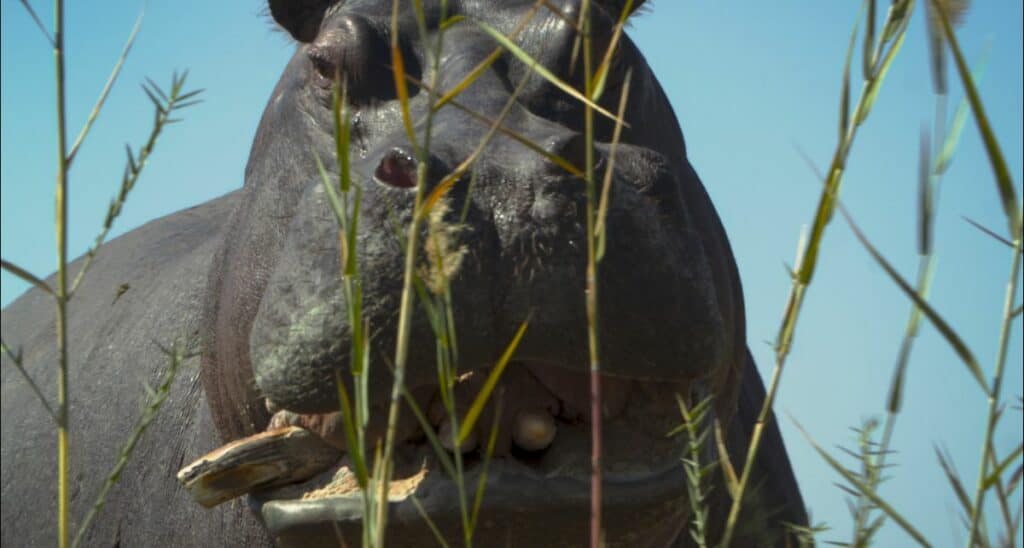Pepe is the second fiction feature by Nelson Carlo de Los Santos Arias, following Cocote in 2017. While the first film premiered at Locarno, the director’s sophomore effort was presented in the Berlinale competition. Pepe is the name of a Hippopotamus, not just any odd hippo, but one owned by the Colombian druglord Pablo Escobar. He famously had four animals brought to him from Südwestafrika (now Namibia) in the late seventies. After his death in 1993, they were allowed to roam around. By 2019, their number had grown to around a hundred, which became a cause for concern for their effect on flora and fauna, but also. as a threat to humans. Clearly, something had to be done.
In 2009, one adult hippopotamus (called “Pepe”) was killed by hunters under the authorization of the local authorities. When a photo of the dead hippo became public, it caused controversy among animal rights groups both within the country and abroad, and further plans of culling stopped. Is this the topic that the Dominican director tackles in his sophomore effort? Only to a certain degree. The film begins with a group of soldiers in Colombia closing in on said animal in order to kill it. The shooting itself is depicted with a blinking car light in black & white, Alphaville style.

Then, we cut to Africa with an overhead shot slowly descending towards the water. Weird animal sounds gradually become the voice of someone who claims to be a hippo. He also says he doesn’t understand how the sounds come out of his mouth and why he is talking like someone can hear him. He also explains that he is dead. He will tell a story about how his forefathers came to Colombia, but most of the time, he gives in to various digressions about life and death and everything in between. That is as much of a story as the film has, but the director has a lot on his mind and many tricks up his sleeve.
Who is Pepe?
Actually, the word trick feels inept when talking about this work, which is one of the most amazing experiences I’ve had in a cinema for a very long time. Pepe is a film that seems to mix and play around with everything, not only formats and colour but also a peculiar sound design that goes beyond the tired phrase, immersive that is thrown around all too easily nowadays. I am not innocent myself, but a search showed that I only used the word in nine texts on TDS, like in the Cuckoo review. The mention of Godard was not coincidental. The exhilaration of watching Pepe is akin to watching early Godard films or maybe Raoul Ruiz at his most inventive.

At a time when film festivals spit out films that are “accomplished” but too often in a stale format, which makes me yawn, Pepe is the film that I’ve been dreaming about while disapproving of virtually everything else. As I’ve stated several times, favourite films are the most difficult to describe. That may sound like a cop-out for anyone tasked with reviewing a film. I still strongly think that it’s true. One could point to the ingenious sound design (not always pleasing to the ear) and the audacious transitions between the shots and sections. Likewise, one could analyze the different modes of shooting, but that would still not be digging very deep.
Comparisons with other films wouldn’t help much, either. On a superficial level, Pepe evokes memories of Eduardo Williams’ The Human Surge (El auge del humano 2016), but the discrepancies are more significant than the similarities. One of the refreshing aspects about Arias’ film is that it can be approached from several angles (colonialism, racism, etc.). Still, none of the said topics is being explored in a perfunctory way. The director rather seems to enjoy himself, and it feels like one is watching a skilled athlete or artist at work who knows exactly what he is doing.
All of the above will still feel like scratching the surface without managing to scratch the itch and come up with a fruitful description of the virtuosity that the director puts on display here. Disparate elements flow together like the connections are obvious, and every surprise is delivered with supreme confidence, and for once, that confidence is strongly merited. Pepe is an overwhelming experience, and for someone who had more or less given up on cinema, it is soothing to see a genuinely bold vision carried out with such panache. At the moment, Pepe feels like one of the greatest works of cinema I have ever experienced.

